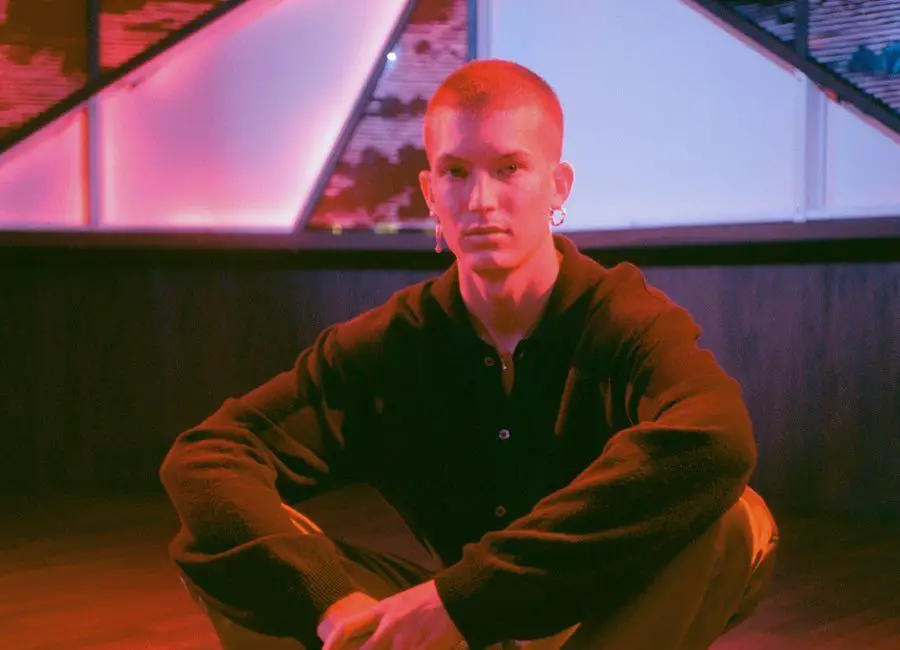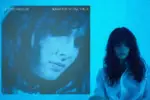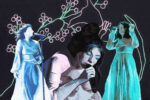Gus Dapperton’s new album “ORCA” toys with pain and healing through a melancholic approach to alternative pop. As someone who listened to Gus Dapperton here and there, the shift in his musical style in “ORCA” is apparent, and is a shift that feels incredibly relevant, especially today. To me, the album almost functions as a send-off to summer, one that was unlike any other. Dapperton’s previous work interacted primarily with change that speaks to the way in which an artist can grow in response to the push and pull of the human experience. The album cover is a grey blue, featuring Dapperton with bright red hair and a weighted facial expression that signals the grievances the project explores before even listening to the album.
On Twitter, Dapperton wrote, “This past year I have become consumed by an inbalance of health….This new music was conceived by my heart and my heart only. It is the product of pure and utter pain that would destroy any attempt of hiding my vulnerability.” And with the release of the first single of the album, a track titled “First Aid,” the cautious transition into vulnerability was apparent. “First Aid” is a heavy song that begins with slow melodies that transform into a deeper ballad. Dapperton sings, “Sorry ’bout my head, it’s in space / I’m still learning how to pace / I’m too atheist to pray for my life / About my head, it’s on straight / But I’m all over the place / I’m too making-shift for shaping a life.”
Lyrically and musically, “First Aid” reflects Dapperton’s new approach to exploring his emotional vulnerability, particularly in response to mental health. On Twitter, Dapperton continued to write, “This album represents everyone and everything’s ability to hurt. Its contents represent everyone and everything’s ability to heal. And its journey represents everyone and everything’s ability to help.” In fact, the melancholic melodies, alongside quick and upbeat ones, tease the beginning of this process in light of a mangled emotional state of being.
With song titles such as “Post Humorous,” “Antidote” and “Medicine,” Dapperton’s exploration of health and healing becomes even more tangible. In “Medicine,” Dapperton confronts how healing can be obstructed through addictive forms of release. Dapperton sings, “But every time I try to hold my own / Yeah, I can never seem to get a grip / And I don’t ever wanna give you up / I always say I’ll get ahead of it / But every time they try to fix me up / I get addicted to the medicine.” The chorus of the song is a solemn consideration of the way in which escaping from pain can become addictive. Methods of avoiding and surviving pain are imperative in confronting the healing process, and “Medicine” captures that form of inner conflict.
And as Dapperton’s earlier music mostly concerned itself with heartache and romantic loss, the commitment to measuring progress as both a musician and an individual is very apparent throughout “ORCA” as a whole. As I researched “ORCA,” it was incredibly moving to continually see how driven Dapperton is by using his music to help others. It may sound like a cliche, albeit a pretty nice one, but it’s comforting to know that this mindset exists. Especially when his music has always seemed to find me during the times when I needed it most.
Dapperton consistently takes to his social media to discuss his artistic process along with explanations for the deeper meaning behind his songs. He uses his social media to post personal updates and interact with his fans; he even set up a phone number so people could text him. Upon the release of the single “Post Humorous,” Dapperton posted a video on his Instagram discussing how the song is his “pride and joy.” In the video, Dapperton also discusses how he uses his music to confront personal conflict along with relating to others.
https://www.instagram.com/p/CCKMjUHp3e6/
“It’s really gratifying to lock those demons away in a sonic form and access them at will whenever I want, whenever I want to learn from the person I was back then. I hope by sharing this music it can heal others, too,” Dapperton said.
And although the album deals with heavy subject matter, sonically, there are elements of the recording that are driven by an upbeat pop sound. The balance between the heavy-hearted yet occasional moments of optimism speaks to the complicated nature of pain and release that Dapperton was inspired by. The first song off of the album, “Bottle Opener,” is a quick, sweet and catchy song. It feels easy going and simple, until the lyrics are considered. Dapperton sings, “I don’t know if I’ll last until tomorrow / It’s such an arduous task to always bottle it up / If you could lend me a breath that I could borrow / Then I could give it my best and try to swallow it up”.
I always feel drawn to projects that operate through an exploration of specific emotional events. It’s inspiring to witness the ways in which artists channel all the attributes of their life into the creation of something introspective. “ORCA” is a prime example of this process. In the wake of the pandemic, it’s been difficult to sift through brief moments of inspiration when the future is still so uncertain. But as so many projects continue to be created and released, it’s apparent that we are simply amid a change in the production and content of art across all mediums. “ORCA” represents the catharsis that can occur through artistic exploration, and how that feeling can be given to others. As Dapperton had mentioned, the intent of the album was rooted in the process of healing. And in its entirety, “ORCA” uses the intricate and multifaceted nature of healing to provide a moment of emotional release.
















